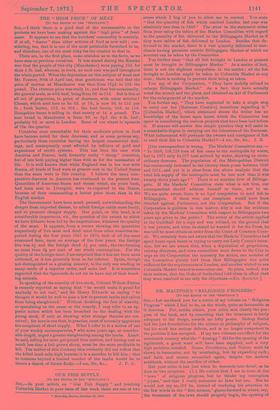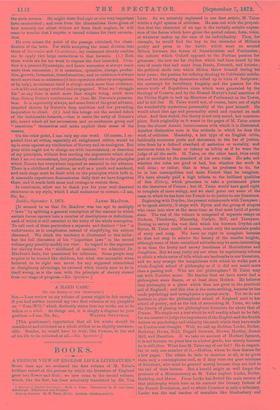DR. MACIVOR'S "RELIGIOUS PROGRESS." [TO THN EDITOR OF THE "SPECTATOR."]
SIR,—Let me thank you for a notice of my volume on "Religious. Progress" which I feel to be, on the whole, quite as favourable as it deserves. For, unlike others, your critic sees clearly the pur- pose of the book, and by conceding that the treatment is fairly adequate to the design, awards me lofty praise. Bishop Butler laid the just foundations for the science or philosophy of religion, but his work has serious defects, and is no longer competent to the position it has occupied. If my two volumes can effect for the nineteenth century what the " Analogy " did for the opening of the eighteenth, a great want will have been supplied, and a very high ambition satisfied. Grace, Providence, and Nature must be shown to harmonise, not by mutilating, but by expanding each ; and faith and reason reconciled again, despite the modern antithesis, without the sacrifice of either.
But your critic is less just when he descends into detail, as he does on two occasions. (1.) He notices that I am to treat of the- " laws " of religious progress, but he thinks my conception "jejune," and that I really announce no laws but one. But he would not say so, did he, instead of confining his attention to- the few words in the "first sermon," glance forward to where, say, the treatment of the laws should properly begin, the opening of the sixth sermon. He might there find eight or nine very important laws enumerated ; and even from the illustrations there given of how seriously our ablest writers err from their neglect, he will cease to wonder that I require a second volume for their enuncia- tion.
He even misses the point of the passage criticized, the classi- fication of the laws. For while accepting the usual division into those of Succession and Co-existence, my treatment already enables me to apply two large correctives to that formula. (1.) Both these words are far too weak to express the fact intended. Crea- tion is a present Dynamique, and hence succession is always much more than succession ; it is causation, operation, change, produc- tion, growth, formation, transformation; and co-existence is always much more than co-existence (it is co-operation either by antagonism or by help), as existence itself is always much more than existence, —it is life and energy evolved and propagated. What we "struggle for" at any time is much more than simple being, much more than Bishop Butler's continuance or than Mr. Darwin's preserva- tion. It is superiority always, and some form of the great advance, impelled thereto by Nature's deep ambition and her pervading imperative to climb. (2.) And this brings out the second defect of the fashionable formula,—that it omits the unity of Nature's life, round which all her successions and co-existences group and " constitute " themselves and make explicit their sense of the
4.11:1813elL
On the other point, I can only say one word. Of course, I ex- pected that all critics, especially all enlightened critics, would be up in arms against my vindication of Slavery and its analogues. But your critic ought not to charge me with inconsistency, or desertion a my principles, without first meeting the arguments which show that I am not inconsistent, but profoundly obedient to the principles which Nature has everywhere imposed as essential to our advance. There is a childhood of nations, as well as a youth and manhood, and each stage must be dealt with on the principles which befit it. A miserable experience demonstrates daily that we have forgotten these, and it needs both sense and courage to restate them.
In conclusion, allow me to thank you for your well-deserved strictures on my style, which I shall endeavour to correct.—I am, Sir, &c., [It seemed to us that Dr. MacIvor was too apt to multiply 4, laws" by splitting a general conception of the manner in which certain forces operate into a number of descriptions or definitions, each of which is still essential to the unity of the whole conception. To call each of these particulars a separate and distinct " law " is cmfortunate, as it complicates instead of simplifying the subject discussed. We think the tendency is illustrated in this letter ; but the full discussion of his "important laws" in the second volume.may possibly modify our view. In regard to the argument for slavery from the "childhood of nations," we admitted Dr. MacIvor's facts, but questioned his inference. Some people may require to be treated like children, but what was excusable when believed to be right can never for any supposed educational or disciplinary advantage, be excused when clearly seen to be in itself wrong, as is the case with the principle of slavery viewed from our stage of progress.—En. Spectator.]



































 Previous page
Previous page